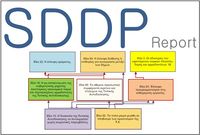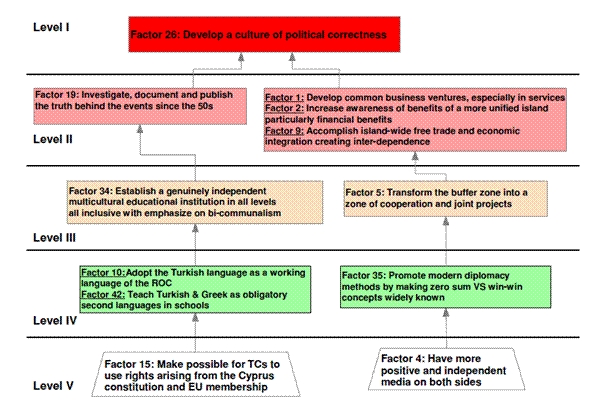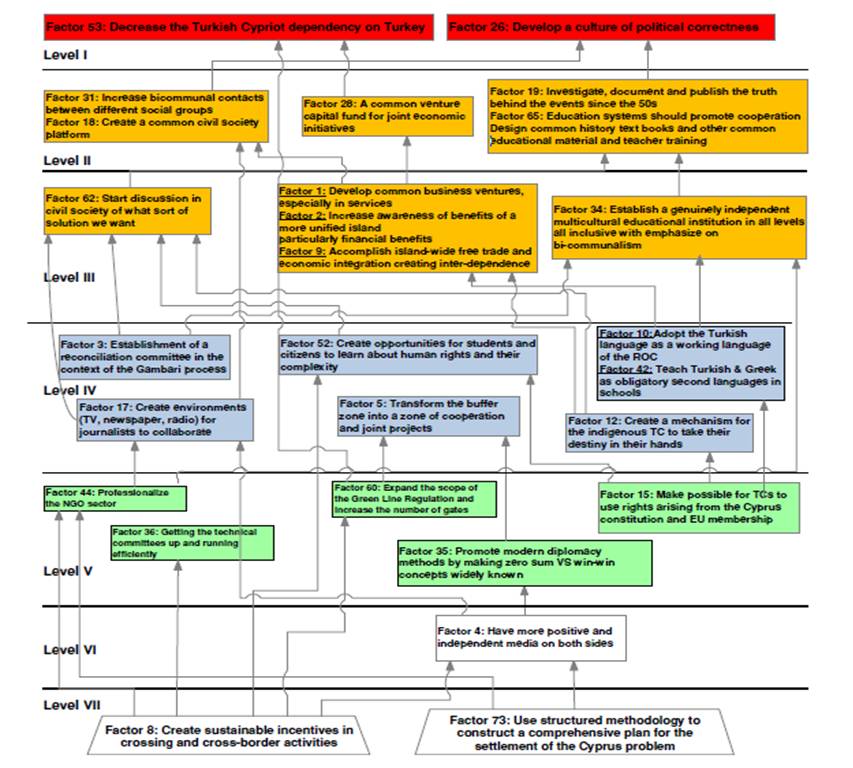SDDP Civil Society Dialogue Options: Difference between revisions
(Created page with "{{SDD_Report <!-- The name of the template --> |acronym=SDDP Civil Society Dialogue - Options <!-- Append to var...") |
(added citation) |
||
| (16 intermediate revisions by 5 users not shown) | |||
| Line 1: | Line 1: | ||
{{SDD_Report | {{SDD_Report | ||
|acronym=SDDP Civil Society Dialogue - Options | |acronym= SDDP Civil Society Dialogue - Options | ||
|book_image= | |book_image= SDDP_Report_Image.jpg | ||
|report_title= Exploring Options for Enhancement of Social Dialogue Between the Turkish and Greek Communities in Cyprus Using the Structured Dialogic Design Process | |||
|Triggering_Question=What goals if achieved, would contribute significantly tobridging the gap between the two communities? | |project= [[Civil Society Dialogue]] | ||
|Triggering_Question= What goals if achieved, would contribute significantly tobridging the gap between the two communities? | |||
|location= | |||
|dates= 10-11 Mar, 2007 | |||
|LeadFacilitator= [[Yiannis Laouris]]<br> [[Marios Michaelides]]<br>[[Aleco Christakis]] | |||
|AsFacilitator= [[Tatjana Taraszow]] <br> [[Ilke Dagli]] | |||
|author= [[Yiannis Laouris]] <br> [[Ali Erel]] <br> [[Marios Michaelides]] <br>[[Mustafa Damdalen]]<br> [[Tatjana Taraszow]] <br> [[Ilke Dagli]] <br> [[Romina Laouri]] <br> [[Aleco Christakis]] | |||
|editor= | |||
|total_duration= 200 person hrs | |||
|stats= N=83 Clusters=13 V=44 R=27 ST=50% SCI=10,88 | |||
|isbn= | |||
|link= [http://www.springerlink.com/content/tu2870qnx285210u/fulltext.pdf Download Open Access] | |||
}} | }} | ||
==Executive Summary== | ==Executive Summary== | ||
The | The Platres Co-Laboratory was part of a series of SDDPs: [[Structured Dialogic Design Process]] [[Co-Laboratory|Co-Laboratories]], which took place between December 2006 and August 2008 all over Cyprus and were implemented by [[Cyprus EU Association]] and [[Cyprus Intercultural Training Initiative]] within the scope of the [[Civil Society Dialogue]] project. <br> | ||
The | The Platres Co-Laboratory was the first of 5 and is often referred to as the ''peace revival SDD''. It took place at the Forest Park Hotel (Platres, Troodos) between 10-11 March, 2007. 20 Cypriots - 8 Greek Cypriots and 12 Turkish Cypriots - participated in the dialogue. Participants included stakeholders of different types to the Cyprus peace process. 15 participants had relevant experience and have contributed significantly to the Cyprus peace process in earlier years.<br> | ||
The [[Knowledge Management Team]] included | The [[Knowledge Management Team]] included [[Yiannis Laouris]], [[Ali Erel]], [[Marios Michaelides]], [[Mustafa Damdelen]], [[Tatjana Taraszow]], [[Ilke Dagli]], and [[Romina Laouri]] plus an international wing lead by [[Aleco Christakis]] with [[Ken Bausch]], [[Roy Smith]], [[Vigdor Schreibman]], and [[Diana Connaway]]. | ||
==[[Triggering Question]] (TQ)== | |||
'''In the context of the overall objective of bridging the gap between the two communities: What short- to medium term goals in your opinion if achieved would contribute significantly to the above objective?'''<br> | |||
In response to the TQ, the 20 participants came up with 83 ideas, which were categorized in 13 clusters. Following the voting process, 44 ideas received one or more votes. 12 ideas were structured to create the influence MAP shown below. <br> | |||
<br> | |||
[[File:CSD_Platres_Map_1.jpg|thumb|center|upright=3.0|alt=Influence tree 1 from the Option SDDP of the Civil Society Dialogue Co-Laboratory.|Influence tree 1 from the Option SDDP of the Civil Society Dialogue Co-Laboratory]] | |||
<br> | <br> | ||
According to the participants of the Platres / peace revival Co-Laboratory, the options with the greatest positive influence on bridging the gap between the two communities in Cyprus were: <br> | |||
* Idea #4, Have more positive and independent media on both sides<br> | |||
* Idea #15, Make possible for Turkish Cypriots to use rights arising from the Cyprus constitution and EU membership<br> | |||
==Mapping== | |||
The Knowledge Management Team later structured an additional 15 ideas to create the influence MAP shown below. <br> | |||
<br> | <br> | ||
[[File:CSD_Platres_Map_2.jpg|thumb|center|upright=3.0|alt=Influence tree 2 from the Option SDDP of the Civil Society Dialogue Co-Laboratory.|Influence tree 2 from the Option SDDP of the Civil Society Dialogue Co-Laboratory]] | |||
<br> | <br> | ||
<br> | |||
According to the revised MAP of the Platres / peace revival Co-Laboratory, the options with the greatest positive influence on bridging the gap between the two communities in Cyprus were: <br> | |||
* Idea #8, Create sustainable incentives in crossing and cross-border activities<br> | |||
* Idea #73, Use structured methodology to construct a comprehensive plan for the settlement of the Cyprus problem<br> | |||
The two most influential options identified in the first MAP moved higher up in the MAP, thus still important | |||
The Co-Laboratory was facilitated by [[Yiannis Laouris]], [[Marios Michaelides]], [[Ilke Dagli]], and [[Tatjana Taraszow]]. | |||
In sum, the participants of the dialogue reported satisfaction that their voices have been heard and documented, therefore they communicated their expectations for follow-up activities to address the diagnosis of their needs.<br> | |||
==Reports== | |||
The full report can be downloaded from [[Media:CSD_SDDP_PeaceRevival_Report_final.pdf| here]]. <br> | |||
The full paper is available from [http://www.springerlink.com/content/tu2870qnx285210u/fulltext.pdf Open Access] | |||
* Laouris, Y., Erel, A., Michaelides, M., Damdelen, M., Taraszow, T., Dagli, I., Laouri, R. and Christakis, A. (2009). Exploring Options for Enhancement of Social Dialogue Between the Turkish and Greek Communities in Cyprus Using the Structured Dialogic Design Process. Syst Pract Action Res 22:361–381. | |||
==Sponsor and partners== | ==Sponsor and partners== | ||
This first Co-Laboratory within the [[Civil Society Dialogue]] project was used to organize a series of follow-up dialogues in areas of utmost importance to the Cyprus problem / Cyprus peace process. Therefore, [[Structured Dialogic Design]] Co-Laboratories focusing on the most influential options to bridge the widening gap between the two communities as identified in the Platres / peace revival dialogue were organized. | |||
The [[Civil Society Dialogue]] project was co-funded by the UNDP-ACT programme. The project consortium consisted of one Turkish Cypriot organization [[Cyprus EU Association]], responsible for the overall project coordination, one Greek Cypriot organization [[Cyprus Intercultural Training Initiative]], and one international organization [[Institute for 21st Century Agoras]]. | |||
==External Links== | ==External Links== | ||
* [http:// | * [http://blogora.wetpaint.com/page/Cyprus+Civil+Society+Dialogue?t=anon| Visit the wiki of the Civil Society Dialogue project here] | ||
* [http://www. | * [http://www.civilsocietydialogue.info/| Visit the website of the Civil Society Dialogue project here] | ||
* [http://www. | * [http://www.springerlink.com/content/tu2870qnx285210u/fulltext.pdf| Download the full paper here] | ||
| Line 53: | Line 82: | ||
[[Category: | [[Category:SDDP (Society)]] | ||
[[Category:SDDP (Peace)]] | |||
[[Category:SDDP (Civil Society Dialogue)]] | |||
[[Category: SDDP Reports]] | |||
Latest revision as of 00:57, 23 February 2023
|
Executive Summary
The Platres Co-Laboratory was part of a series of SDDPs: Structured Dialogic Design Process Co-Laboratories, which took place between December 2006 and August 2008 all over Cyprus and were implemented by Cyprus EU Association and Cyprus Intercultural Training Initiative within the scope of the Civil Society Dialogue project.
The Platres Co-Laboratory was the first of 5 and is often referred to as the peace revival SDD. It took place at the Forest Park Hotel (Platres, Troodos) between 10-11 March, 2007. 20 Cypriots - 8 Greek Cypriots and 12 Turkish Cypriots - participated in the dialogue. Participants included stakeholders of different types to the Cyprus peace process. 15 participants had relevant experience and have contributed significantly to the Cyprus peace process in earlier years.
The Knowledge Management Team included Yiannis Laouris, Ali Erel, Marios Michaelides, Mustafa Damdelen, Tatjana Taraszow, Ilke Dagli, and Romina Laouri plus an international wing lead by Aleco Christakis with Ken Bausch, Roy Smith, Vigdor Schreibman, and Diana Connaway.
Triggering Question (TQ)
In the context of the overall objective of bridging the gap between the two communities: What short- to medium term goals in your opinion if achieved would contribute significantly to the above objective?
In response to the TQ, the 20 participants came up with 83 ideas, which were categorized in 13 clusters. Following the voting process, 44 ideas received one or more votes. 12 ideas were structured to create the influence MAP shown below.
According to the participants of the Platres / peace revival Co-Laboratory, the options with the greatest positive influence on bridging the gap between the two communities in Cyprus were:
- Idea #4, Have more positive and independent media on both sides
- Idea #15, Make possible for Turkish Cypriots to use rights arising from the Cyprus constitution and EU membership
Mapping
The Knowledge Management Team later structured an additional 15 ideas to create the influence MAP shown below.
According to the revised MAP of the Platres / peace revival Co-Laboratory, the options with the greatest positive influence on bridging the gap between the two communities in Cyprus were:
- Idea #8, Create sustainable incentives in crossing and cross-border activities
- Idea #73, Use structured methodology to construct a comprehensive plan for the settlement of the Cyprus problem
The two most influential options identified in the first MAP moved higher up in the MAP, thus still important
The Co-Laboratory was facilitated by Yiannis Laouris, Marios Michaelides, Ilke Dagli, and Tatjana Taraszow.
In sum, the participants of the dialogue reported satisfaction that their voices have been heard and documented, therefore they communicated their expectations for follow-up activities to address the diagnosis of their needs.
Reports
The full report can be downloaded from here.
The full paper is available from Open Access
- Laouris, Y., Erel, A., Michaelides, M., Damdelen, M., Taraszow, T., Dagli, I., Laouri, R. and Christakis, A. (2009). Exploring Options for Enhancement of Social Dialogue Between the Turkish and Greek Communities in Cyprus Using the Structured Dialogic Design Process. Syst Pract Action Res 22:361–381.
Sponsor and partners
This first Co-Laboratory within the Civil Society Dialogue project was used to organize a series of follow-up dialogues in areas of utmost importance to the Cyprus problem / Cyprus peace process. Therefore, Structured Dialogic Design Co-Laboratories focusing on the most influential options to bridge the widening gap between the two communities as identified in the Platres / peace revival dialogue were organized.
The Civil Society Dialogue project was co-funded by the UNDP-ACT programme. The project consortium consisted of one Turkish Cypriot organization Cyprus EU Association, responsible for the overall project coordination, one Greek Cypriot organization Cyprus Intercultural Training Initiative, and one international organization Institute for 21st Century Agoras.
External Links
- Visit the wiki of the Civil Society Dialogue project here
- Visit the website of the Civil Society Dialogue project here
- Download the full paper here


